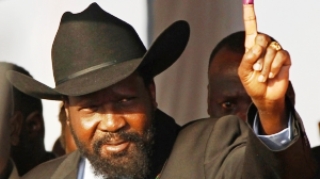Parliament should have impeached president Kiir for defying lawmakers: journalist
July 19, 2013 (JUBA) – A political activist and veteran journalist has challenged the South Sudan national assembly for failure to impeach President Salva Kiir over his rejection to implement a resolution passed by the lawmakers to punish 75 corrupt officials he had informed lawmakers about.

He said Kiir defiantly refused to implement the resolution passed by the nation’s parliament, asking him to suspend and investigate the 75 former and current officials of his government and prosecute those find guilty of stealing the public funds.
In a letter he wrote to the suspects and presented to the parliament, the president said the officials were responsible for the disappearance of up to $4 billion during the six-year interim period of the former semi-autonomous government between 2005 and 2011 prior to independence.
The president however refused to implement the resolution of the parliament which was meant to support his fight against corruption and instead reacted by threatening to dissolve the parliament; a move which silenced the lawmakers over the matter.
Taban said he was disgusted by the silence of lawmakers on the matter, adding that they should have reacted by summoning the president which could have led to his impeachment.
“The parliament should have impeached the president”, he said, while challenging the SPLM-led executive and parliament for failing the nation.
The veteran scribe, who is also a member of SPLM, accused the ruling party leaders for failing the test in the last eight years.
However, Peter Bashir Bandi, a member of the national parliament representing Mundri constituency in Western Equatoria state, rejected the generalization of failure among the SPLM leaders and the party, saying it was only a small clique within the party that had corrupted the system.
SPLM PERFORMED ABOVE AVERAGE
The roundtable debate was generated by the results of the survey released on Friday in the capital, Juba, which was conducted by the US-based International Republican Institute (IRI) in the various counties of the ten states of South Sudan.
The survey which assessed the people’s responses to the various affairs of the nation painted a bad picture of the status quo, particularly on issues of governance, and put the SPLM performance at 68%.
The survey involved over 2,500 respondents from different sections of society but was criticized for by many observers for inaccuracy as language barriers were believed to have not provided the correct understanding of the questionnaires.
Majority of the people in the rural areas do not speak, read and write English and Arabic.
The SPLM-led government was criticized for failing to tackle corruption, insecurity, tribalism and the accompanying lack of development and provision of basic services to the people who suffered for decades and came out of war.
The rate given to the president, Salva Kiir had fallen much lower 71% from 93% votes he secured during the 2010 presidential elections.
Alfred said the president’s rating in the survey was largely based on his memorable legacy for successfully implementing the CPA and achieving the independence in 2011 and not based on the current bad situation the country faces in the nation building.
He said the SPLM leaders had proven to be failures in the nation-state building, saying the corrupt practices with impunity by its members had spoiled the name of the once powerful movement.
Despite Kiir’s repeated declaration of zero tolerance on corruption, many people believe that he doesn’t have a genuine political will to fight it.
Eight years down the road, only 1% of the 10 million populations in the country have access to electricity.
The country has only over 200kms of paved roads out of the estimated 10,000kms of roads network across the country.
It has some of the worst health indicators in the world while more than half of its populations are food insecure.
The newest country on earth was ranked in the fourth position of the world’s failed states, but officials criticize the conclusion arguing that the two-year old nation needed time to mature.
(ST)
